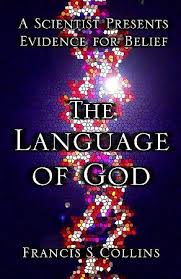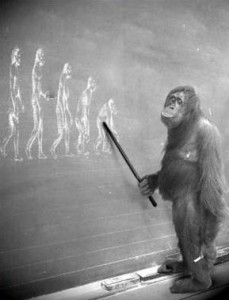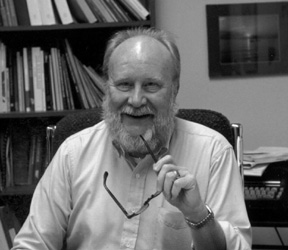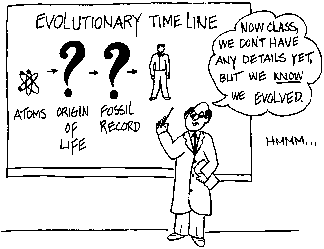 One one hand, I am often accused by Christians of being an “evolutionist” because I believe that the creation is billions of years old. On the other hand, atheists accuse me of being a science denier because I doubt Darwinism. As one with training in chemistry and physics from an accredited University. It seems like I would have to check my brain at the church door to believe in a thousands-of-years old world. (However, a scientific possibility remains plausible.) Bishop Ussher’s goal was admirable but misguided given recent Ancient Near East scholarship and archeology. The date of creation is not in the Bible, rather it’s an extrapolation more akin to date-setting the rapture than exegesis. Paul said atheists are without excuse by what has been made (Rom 1:20). However, if God made a young earth look so old just to fool the atheists, it seems as if they have a viable excuse. In light of Romans 1:20 the “appearance of age” argument I often hear from young earth creationists (YEC) disparages God’s character. I do not accept the negative implications young earth creationism imposes on a Holy God who does not lie.
One one hand, I am often accused by Christians of being an “evolutionist” because I believe that the creation is billions of years old. On the other hand, atheists accuse me of being a science denier because I doubt Darwinism. As one with training in chemistry and physics from an accredited University. It seems like I would have to check my brain at the church door to believe in a thousands-of-years old world. (However, a scientific possibility remains plausible.) Bishop Ussher’s goal was admirable but misguided given recent Ancient Near East scholarship and archeology. The date of creation is not in the Bible, rather it’s an extrapolation more akin to date-setting the rapture than exegesis. Paul said atheists are without excuse by what has been made (Rom 1:20). However, if God made a young earth look so old just to fool the atheists, it seems as if they have a viable excuse. In light of Romans 1:20 the “appearance of age” argument I often hear from young earth creationists (YEC) disparages God’s character. I do not accept the negative implications young earth creationism imposes on a Holy God who does not lie.
YEC effectively turns Yahweh into a trickster, who is fooling scientists with deceptive data. However, that does NOT make me a “theistic evolutionist” – the proper term is “progressive creationist” or perhaps “intelligent design theorist.” Neo-Darwinism as defined by Richard Dawkins and his crew is incoherent and self defeating. Without pre-existing reproducing life, Darwinism never gets off the ground, it explains adaptation at best, not origins. It’s a faith position the way atheists hold it.
I am far more challenged by Francis S. Collins, M.D., Ph.D., the director of the Human Genome Project and an evangelical Christian — who promotes the Gospel. His book “The Language of God: A Scientist Presents Evidence for Belief.” –presents a case for “theistic evolution” — which seems almost contradictory given the Dawkins definition (it seems incoherent as well because nothing is “theistic” about a random process).
However, the word “evolution” is notoriously imprecise and is usually used in equivocation fallacies like when micro-evolution is used as evidence for macro-evolution and basically proves nothing but adaptation and breeding to promote certain traits is even in the Bible. So small changes within a phenotype over time are NOT evidence for common ancestry.
Worse yet, is abiogenesis (life from non-life) — the darwinist will always attempt to end the discussion by announcing its an entirely different subject and quickly steer the conversation as far away as possible. I refuse to follow the red herring – my REAL issue is with NATURALISM leading to atheism / agnosticism.
Naturalists make appeals to evidence when asserting the superiority of their atheistic worldview. Without abiogenesis naturalistic evolution has NO viable chance of being true, and there’s conspicuously no evidence for abiogenesis– special pleading about a primordial mythological “RNA World” aside — there much more evidence to the contrary — the best theory naturalists seem to have is “aliens seeded life on earth” which does not even answer the origin of life question, but rather pushes it out into space, where no life has been observed, — I call it “aliens of the gaps” reasoning but in science is a real theory called Panspermia and advocated by Nobel Prize winner Francis Crick and Richard Dawkins too— this is naturalism as a religious faith, not science.
I object to naturalist evolution for theological reasons but mostly from mathematical proofs showcasing the massive improbabilies involved in intelligent life evolving by random mutation and natural selection. When you realize that virtually nothing feasible has come from centuries of abiogenesis research, the neo-darwinian tale resembles Greek mythology more than science.
Yet Dawkins and his kind, call Christians “delusional” for believing in a Creator God. So I am posting this article, that might anger some of my brothers in Christ. I I am now convinced that to God my intellectual honesty is more important than being right. Yes, the discussion on evolution is very important… but as my chemistry teacher at NCSU, Kay Sandberg PhD Organic Chemistry. once advised me “Cris, do not let your opinion about origins ever get in the way of the fact that Christ died for your sins.” — That’s right a science teacher at one of the top engineering schools in the USA, gave me that wisdom.
Now I am on thin ice, very thin in Baptist circles, and some seminaries would fire me for even suggesting the possibility that this verse might be a metaphor for a process – elements like carbon forming into a carbon based body which has a soul breathed into it.
“Then the Lord God formed man of dust from the ground, and breathed into his nostrils the breath of life; and man became a living being.”(Genesis 2:7)
It creates problems with other passages but quiet a few conservative scholars do not find them unsurmountable exegetically, take a look at BioLogos.org for that material. I find Brian Godawa’s articles and movie reviews to be thought-provoking and, often, personally convicting.
Accordingly, it’s important to READ Francis Collins carefully and make an effort to understand his reasoning and the evidence behind it, BEFORE assuming he is misled by his naturalistic scientific training (which is still on the table). But real science is EVIDENCE BASED and is usually well reasoned. For example, we are communicating over the internet which assumes truths derived from the wackiest (but most reliable) theories in the world of science, called quantum mechanics and thermodynamics — both can seem so awesomely contradictory that many successful scientists have committed suicide over the nature of reality, according to real observational science.
“Ludwig Boltzmann, who spent much of his life studying statistical mechanics, died in 1906, by his own hand. Paul Ehrenfest, carrying on the work, died similarly in 1933. Now it is our turn to study statistical mechanics. Perhaps it will be wise to approach the subject cautiously.”
David L. Goodstein, States of Matter, (Mineola, NY: Dover Publications, 2002) pg. 1
When it comes to the implications presented by thermodynamics and quantum mechanics, naturalists seem to prefer death to science.
Read Quantum Enigma : Physics Encounters Consciousness if you really want to rock your understanding of the world we really do live in. There is strong evidence subatomic particles can be in two places at the same time. Even worse, a light photon can behave like a particle or a wave, depending on if a person observes it… how could human consciousness affect the nature of physical reality in a naturalistic universe? Quantum mechanics is considered the most proven theory in all of science – all computer technology is absolutely dependent on it being true – yet it presents enigmas that are downright illogical — hence the suicides by brilliant mathematicians and physicists when they faced its implications.
I am convicted that, although I will always be a creationist of some stripe, a simple hand-wave type dismissal when it comes to the theory of evolution, common ancestry is laziness on my part. It makes one seem ignorant and it actually misrepresents God, just as much as the atheist. Why? Do you really understand the science? I cannot say I am even a marginal biologist. Francis Collins is a Christian but was competent enough to be hired to direct the human genome project. Collins has the Holy Spirit and a PhD in science, he says the evidence is compelling from the genome that God used an evolutionary process to form our physical bodies. Collins deserves a fair hearing from Christians but most will label him a heretic or liberal. I am ashamed to say I purchased his book The Language of God: A Scientist Presents Evidence for Belief over a year ago but haven’t made the time to read it, (I have a easy excuse because I read most of the day for my work as an apologist, writer, and researcher). I also work with many scientists at Cocoon Resources a group of Christians investing in transformational energy, medical, pharmaceutical, and biotech inventions–through a Christian worldview ethic. I value intellectual honesty, if I am wrong about evolution I would like to know, even if it makes me feel a bit foolish about my former opinions). God reveals himself two ways: Natural Revelation (Romans 1:20) and special revelation (2 Timothy 3:16). They both need to be interpreted by experts to be properly understood. If they disagree, someone’s interpretation is incorrect, either the biblical exegesis is in error, as Galileo learned the hard way, or rather the interpretation of natural revelation (science) is faulty.
I am not “coming out” as an evolutionist but rather admitting a level of prideful incompetence. I have been quite vocal against Darwinism – I still believe naturalism is incoherent — but I have a feeling Collin’s perspective might lead me to an ethical conviction, mainly because I am hardly qualified to speak with authority concerning the evidence from genetics. Collins seems to believe it is decisive that something like evolution was involved in creating our physical bodies.
Collins: Why this scientist believes in God
By Dr. Francis Collins
Special to CNNAdjust font size:Editor’s note: Francis S. Collins, M.D., Ph.D., is the director of the Human Genome Project. His most recent book is “The Language of God: A Scientist Presents Evidence for Belief.”
ROCKVILLE, Maryland (CNN) — I am a scientist and a believer, and I find no conflict between those world views.
As the director of the Human Genome Project, I have led a consortium of scientists to read out the 3.1 billion letters of the human genome, our own DNA instruction book. As a believer, I see DNA, the information molecule of all living things, as God’s language, and the elegance and complexity of our own bodies and the rest of nature as a reflection of God’s plan.
I did not always embrace these perspectives. As a graduate student in physical chemistry in the 1970s, I was an atheist, finding no reason to postulate the existence of any truths outside of mathematics, physics and chemistry. But then I went to medical school, and encountered life and death issues at the bedsides of my patients. Challenged by one of those patients, who asked “What do you believe, doctor?”, I began searching for answers.
I had to admit that the science I loved so much was powerless to answer questions such as “What is the meaning of life?” “Why am I here?” “Why does mathematics work, anyway?” “If the universe had a beginning, who created it?” “Why are the physical constants in the universe so finely tuned to allow the possibility of complex life forms?” “Why do humans have a moral sense?” “What happens after we die?”
>






